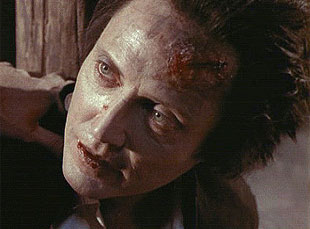Craig from Dark Eye Socket here with Take Three. This week: Christopher Walken

Take One: True Romance (1993)
One of Tony Scott’s best loved films was True Romance, based on Quentin Tarantino’s script. And one of its most fondly remembered supporting performances was Walken’s psychotic criminal Vincenzo Coccotti. His sole scene – the ‘Sicilian scene’ as it became dubbed – is often quoted for its spiky dialogue and playful yet intense interaction. In the scene Walken pays a visit to Clifford Worley (Dennis Hopper) for information on the whereabouts of the latter’s son Clarence (Christian Slater). Worley knows that he’s going to die regardless of what he tells Coccotti, so he relates an offending story hoping to insult him as a last FU. For the most part Walken does seemingly very little; Hopper does most of the talking. But his responses, his turning to his henchmen for reactions and hardy yuck-yuck laugh add an amusingly unsettling tension. Walken’s screen persona in scenes of violence has often relied on his characters’ ability to suddenly snap and violently “disagree” with other characters (see A View to a Kill and King of New York particularly). Walken waits out the bulk of the scene, letting Coccotti’s rage simmer as Worley offends him. Coccotti never rises to the verbal bait; Walken doesn’t overplay it. (Apparently, only the words ‘eggplant’ and ‘cantaloupe’ were adlibbed to the script as written.) He sits listening, stewing in his carefully guarded anger. It’s obvious he’ll boil over at some point but we don’t know when. Though he embeds himself in your mind quickly, he generously lets Hopper shine for the scene's duration before shrewdly asserting himself, switching into psycho mode for the finish.
I haven’t killed anyone since 1984"
Walken's savvy waiting game here is testament to how he regularly imbues a film with sly style through his uniquely scary persona. The scene is barely five minutes long, and Walken has only a handful of words, but he does some of his best supporting work within the timeframe.
 Take Two: The Prophecy (1995)
Take Two: The Prophecy (1995)
In certain films, like Gregory Widen's The Prophecy, you can watch Walken gleefully munching on scenery with spiky relish. The movie is all angels and demons, half-cocked yet overcooked religious claptrap and hammy bit parts for character actors: Eric Stoltz snogs a corpse, Elias Koteas wears a wig, Amanda Plummer does her Amanda Plummer thing and Viggo Mortensen resembles a Bee Gee... all in the name of a ‘second war in heaven’ or some such malarkey. But when Walken turns up in leather trousers and a light sweat the film vastly improves. He plays the angel Gabriel (yup, that one) and approaches the role like a clammy vampire doing a stand-up routine. Walken isn't necessarily taking this dodgy-dye-jobbed divine seriously but if he had it wouldn't be half as much fun to watch. Instead, he merely assumes an iffy ethereal identity and riffs rampantly on it enough to make it work. With zesty showmanship he sniffs the air like a quizzical dog and points at the bodies of dead angels to make them explode into flames.
This could have been embarrassing screen behaviour but, hey, it’s Christopher Walken, and he has ways of making even his most ludicrous characters act cool. There’s a dash of the trademark wide-then-quickly-squinting-eyes thing he does so well to infer internal mania, plus his SHOUTING of EVERY other WORD tic, but it’s clear that Walken was having a grand old time.
Take Three: The Deer Hunter (1978)
Walken’s character in Michael Cimino’s The Deer Hunter, Nikanor "Nick" Chevotarevich, experiences an unfortunate decline from amiable Pennsylvanian steel worker to war-scarred wreck of a man who sadly disintegrates into mental oblivion. We first see him as he enjoys his last civilian days dancing at a wedding with girlfriend Linda (Meryl Streep) and on one final deer hunt with friends Mike and Steven (Robert DeNiro, John Savage). Walker's crucial shading of a wide array of characteristics make Nick into the film’s most fascinating character and he rightly won a Best Supporting Actor Oscar. Your eyes go straight to Walken in every scene, regardless of whether he’s sharing them with talents as commanding as DeNiro or Streep.

Nick’s descent from the man who so cheerfully joins in a sing-along to Frankie Valli to the haunted figure in a back-street Saigon gambling den is played as a harrowing gradual collapse of character. The arc is conveyed with subtle downward increments in performance style. The way Walken barely retains his relief and exhilaration behind a near-unreadable grimace of tears and incredulous laughter when he “wins” the first Russian roulette sequence is a wonderfully precise piece of acting. Just as good is the scene where he’s sat on the balcony of the Saigon hospital after his rescue. As the doctor probes him with questions he quietly breaks down, clearly reminded that he once had love, a family, a history. This moment and the agonising final Russian roulette scene showcase Walken’s work best, but the performance is propelled by every minor and major thing he does beforehand. It’s acting that reveals so much more by actually holding everything back.
Three more films for the taking: The Dead Zone (1983), The Addiction (1995), Catch Me If You Can (2002)